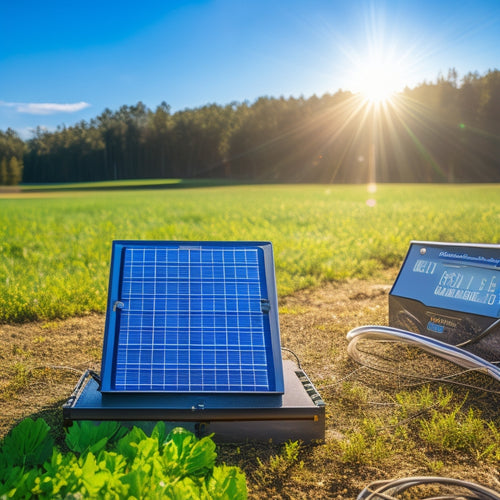
Solar Energy Battery Cost
Share
As you investigate solar energy batteries, you're likely wondering about the cost. The good news is that prices have decreased, making clean energy storage more accessible. You can expect to pay between $5,000 to $15,000 or more, depending on the type and quality of the battery, as well as the capacity you need. Lithium-ion batteries, which offer superior cycle life and efficiency, tend to be more expensive than lead acid batteries. To maximize your investment, you'll want to evaluate factors like battery capacity, depth of discharge, and cycle life expectancy. By understanding these key aspects, you'll be able to make an informed decision that sets you on the path to energy independence and significant long-term savings.
The Essentials
- Decreased costs of solar energy batteries make them more accessible for homeowners, aligning with renewable energy trends.
- Government incentives, including tax credits and rebates, can reduce solar energy battery costs by up to 30%.
- Advanced lithium-ion batteries offer longer lifespans and lower maintenance, resulting in reduced overall costs.
- Higher capacity batteries contribute to cost savings over time, especially with deeper discharge rates and longer cycle life.
- The total cost of ownership for lithium-ion batteries is lower compared to lead acid batteries due to their superior cycle life and efficiency.
Zero Energy Bills Possible
You can now reap the financial benefits of solar energy by saving money on your energy bills.
With a solar energy battery system, you're guaranteed energy independence, allowing you to generate your own power and reduce your reliance on the grid.
By utilizing the power of the sun, you can greatly reduce or even eliminate your energy bills altogether.
Save Money Now
Energy independence beckons with solar energy battery cost savings that can eliminate electricity bills altogether. You can save money now by switching to solar energy, and the benefits don't stop there.
| Benefit | Description | Potential Savings |
|---|---|---|
| Reduced Electricity Bills | Solar energy reduces your reliance on the grid, lowering your electricity bills. | Up to 50% |
| Financial Incentives | Governments offer tax credits and rebates for switching to solar energy. | Up to 30% |
| Increased Property Value | Installing solar energy systems increases your property's value. | Up to 10% |
Energy Independence Guaranteed
Solar energy battery cost savings extend beyond reducing electricity bills, as they can entirely eliminate reliance on the grid. By utilizing home battery storage systems, you can guarantee that your essential appliances and lighting remain on even during power outages, and you can also shave peak demand charges and reduce your overall energy usage during those times of the day when energy rates are at their highest.
You can achieve energy autonomy, a state where you generate and store enough energy to meet your needs without relying on external power sources. With a solar energy battery system, you're no longer tied to the grid, and you can say goodbye to those pesky energy bills. This means you'll have zero energy bills, and you'll be free from the uncertainty of fluctuating energy prices.
You'll be taking a significant step towards a sustainable future, reducing your carbon footprint, and contributing to a cleaner environment. By utilizing the power of the sun, you'll be generating clean energy, reducing greenhouse gas emissions, and doing your part to combat climate change.
With energy independence, you'll have the freedom to live life on your own terms, without worrying about the cost of keeping the lights on. You'll be in control of your energy needs, and you'll be proud to be part of the renewable energy revolution.
Low Carbon Footprint Guaranteed
You're likely aware that solar energy batteries are a transformative innovation for reducing emissions today.
By storing clean energy, you'll greatly decrease your reliance on fossil fuels, which in turn reduces the amount of greenhouse gases released into the atmosphere.
In fact, with deep cycle batteries and advanced inverter technology, you can optimize your energy efficiency and maximize your savings.
With a solar energy battery, you can rest assured that your carbon footprint will be considerably lower, clearing the path for a cleaner, more sustainable future.
Reduced Emissions Today
Optimize your carbon footprint by harnessing solar energy batteries, which guarantee a significant reduction in emissions today.
By integrating these batteries into your energy system, you'll witness a substantial decrease in your reliance on fossil fuels, leading to a considerable emission reduction. This, in turn, will minimize your carbon footprint, allowing you to enjoy the freedom of sustainable energy.
With advanced home power backup systems Energy Storage Systems, you can maximize your renewable energy and reduce your reliance on the grid.
Solar energy batteries are designed to store excess energy generated by solar panels during the day, enabling you to make use of it during the night or on cloudy days.
This setup guarantees a consistent and reliable energy supply, reducing your dependence on the grid and the associated emissions.
With solar energy batteries, you can rest assured that your energy consumption is environmentally friendly, contributing minimally to air pollution and climate change.
Clean Energy Storage
Your shift to clean energy storage begins with a low-carbon footprint guarantee, thanks to advanced solar energy batteries.
These state-of-the-art solutions enable seamless solar panel integration, ensuring a reliable and efficient energy supply. With the ability to store excess energy generated during the day for use during the night or on cloudy days, you can enjoy uninterrupted power while reducing your reliance on the grid.
As you move toward clean energy storage, you're not only reducing your carbon footprint but also staying ahead of renewable energy trends.
The cost of solar energy batteries has decreased considerably, making it a viable option for homeowners and businesses alike. With advanced battery technology, you can store excess energy generated by your solar panels and use it when needed, reducing your energy bills and dependence on fossil fuels.
Deep Cycle Battery Technology
When selecting a deep cycle battery for your solar energy system, you'll want to take into account advanced battery chemistry that enables efficient energy storage and release.
This is vital because it directly impacts the battery's cycle life expectancy, which refers to the number of charge and discharge cycles it can handle before its capacity degrades.
High-performance batteries, such as lithium ion battery, can provide a longer lifespan and reduced maintenance costs.
Advanced Battery Chemistry
Deep cycle batteries, the backbone of solar energy systems, have witnessed a significant change with the advent of advanced battery chemistry. You're now experiencing a significant leap in energy storage capabilities. The integration of advanced battery chemistry has led to extraordinary battery innovations, enhancing your overall solar energy system's performance.
One of the most notable advancements is the increase in energy density. This means you can store more energy per unit of weight and volume, making your system more efficient and compact.
With advanced battery chemistry, you can expect higher discharge rates, longer battery life, and reduced maintenance requirements. This translates to more freedom from the grid and a significant reduction in your energy costs.
The improved chemistry also enables faster charging and discharging, allowing you to utilize the full potential of your solar panels. As you investigate advanced battery chemistry, you'll uncover a more reliable, efficient, and cost-effective way to power your life.
Cycle Life Expectancy
Cycle Life Expectancy, a critical performance metric for deep cycle batteries, directly impacts the overall reliability and cost-effectiveness of your solar energy system. You need to contemplate the battery's lifespan to guarantee you're getting the most out of your investment. A longer cycle life expectancy translates to fewer replacements, reduced maintenance costs, and a lower overall cost of ownership.
| Cycle Life Expectancy | Impact on Your Solar Energy System |
|---|---|
| 3000 cycles | Requires more frequent replacements, resulting in higher maintenance costs and a shorter system lifespan |
| 5000 cycles | Provides a moderate lifespan, balancing upfront costs with maintenance considerations |
| 8000 cycles | Offers a longer lifespan, reducing maintenance costs and increasing overall system reliability |
| 10,000+ cycles | Delivers exceptional battery longevity, minimizing replacements and guaranteeing a highly cost-effective system |
When evaluating deep cycle batteries, you should prioritize cycle life expectancy to guarantee you're getting a reliable and cost-effective solution. By contemplating this critical metric, you can make informed decisions about your solar energy system, achieving the freedom and independence you desire.
Battery Capacity Matters Most
When you're determining the battery capacity you need for your solar energy system, you'll want to take into account two critical factors: depth of discharge and cycle life.
For instance, homeowners who opt for off grid solar battery systems often prioritize deeper discharge rates to maximize their energy independence.
You'll need to decide how deeply you're comfortable discharging your batteries on a daily basis, as this will impact their overall lifespan.
Additionally, the number of charge cycles your batteries can handle will greatly affect their cost-effectiveness.
Depth of Discharge Matters
Your solar energy battery's capacity is only as good as its depth of discharge, which refers to the percentage of the battery's capacity that's actually usable. This is a critical factor in determining your battery's overall performance and longevity.
A higher depth of discharge means you can use more of your battery's capacity before recharging, resulting in greater discharge efficiency. This, in turn, can lead to significant cost savings over time.
When choosing a solar energy battery, look for one with a high depth of discharge. This will guarantee you're getting the most out of your investment.
A deeper discharge also means your battery will last longer, reducing the need for frequent replacements. This extends the battery's lifespan, saving you money and hassle in the long run.
Cycle Life Impacts Cost
Battery capacity is a critical factor in determining the overall cost of your solar energy battery, and cycle life plays a significant role in this calculation.
You see, cycle life refers to the number of charge and discharge cycles your battery can handle before its capacity starts to degrade. The more cycles your battery can handle, the longer it'll last, and the lower your maintenance costs will be.
A higher cycle life means you'll need to replace your battery less often, which can save you money in the long run. Additionally, a battery with high cycle efficiency will retain more of its capacity over time, reducing the need for premature replacements.
This is especially important for solar energy systems, which rely on batteries to store excess energy generated during the day for use at night or during power outages.
When evaluating solar energy battery options, consider the cycle life and efficiency of each model. A battery with a longer cycle life and higher efficiency will likely cost more upfront, but it'll pay off in the long run through reduced maintenance costs and a longer lifespan.
Lithium-Ion Beats Lead Acid
You'll find that lithium-ion batteries outperform lead acid batteries with respect to cycle life, with some lithium-ion batteries lasting up to 5,000 cycles or more.
In contrast, lead acid batteries typically max out at around 1,000 to 2,000 cycles.
This significant difference in cycle life has a direct impact on your solar energy system's overall cost and efficiency.
Longer Cycle Life
Cycle life, a critical factor in determining the overall cost of ownership for solar energy systems, is considerably longer for lithium-ion batteries compared to lead acid batteries.
You'll benefit from a significant reduction in battery maintenance and replacement costs over the lifespan of your system. Lithium-ion batteries can last up to 5,000 cycles or more, whereas lead acid batteries typically last around 1,000 to 2,000 cycles. This means you'll need to replace your lead acid batteries five times more often than lithium-ion batteries, resulting in higher overall costs.
Lithium-ion batteries also offer higher charging efficiency, which reduces the energy wasted during charging and discharging. This results in more usable energy for your solar energy system, increasing your overall energy independence.
With a longer cycle life and higher charging efficiency, lithium-ion batteries provide a more cost-effective and reliable solution for your solar energy system. By choosing lithium-ion batteries, you'll enjoy a lower total cost of ownership and greater freedom from energy bills.
Frequently Asked Questions
What Is the Average Lifespan of a Solar Energy Battery?
You're likely wondering about the average lifespan of a solar energy battery. It typically ranges from 10 to 15 years, depending on battery performance and lifespan factors such as depth of discharge, temperature, and charging cycles.
Can I Use a Solar Energy Battery for Backup Power?
You can use a solar energy battery for backup power, choosing from various battery types like lead-acid, lithium-ion, or flow batteries, and integrating them into backup systems that provide reliable energy independence during outages.
Are Solar Energy Batteries Eligible for Government Incentives?
As you open the door to renewable energy, you'll find that yes, you're eligible for government incentives, including tax credits, through various programs, providing a financial enhancement to offset the initial investment and enabling your path to energy independence.
Can I Install Solar Energy Batteries in My Existing Home?
You can install solar energy batteries in your existing home, integrating them with your current solar installation. You'll need to choose suitable battery types, such as lithium-ion or lead-acid, ensuring compatibility with your existing system's voltage and capacity.
How Often Should I Maintain My Solar Energy Battery?
You'll be surprised to know that 90% of battery failures are preventable with proper maintenance! To maximize your solar energy battery's lifespan, you should perform routine checks every 3-6 months, inspecting connections and ensuring ideal operating temperatures, as these factors greatly impact battery lifespan.
Final Thoughts
You've finally made it to the end of this solar energy battery cost rundown, and you're probably thinking, "Great, I'll just install some panels and batteries, and voilà! Zero energy bills and a clear conscience." Not so fast. The reality is, you'll need to shell out some serious cash upfront, and even then, your carbon footprint won't be exactly zero. But hey, at least you'll be able to Instagram your eco-friendly setup and impress your friends with your "green" credentials.
Related Posts
-

Solar Phone Chargers for Camping Essentials
Solar phone chargers are must-haves for your camping essentials, allowing you to stay connected while enjoying nature...
-

Top Portable Refrigerators for Camping Adventures
When you're camping, having a reliable portable refrigerator can make all the difference for keeping your food fresh ...
-

Choosing the Right Solar Power Charge Controller
Choosing the right solar power charge controller is crucial for maximizing energy efficiency and extending battery li...


